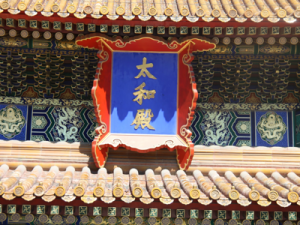 The words in the title of this blog are inscribed on the facade of the National Archives in Washington, DC, but actually they are a corruption of the Bard’s words in The Tempest Act II, Scene I wherein he wrote “ whereof what’s past is just prologue of what’s to come, that is, the future”. If China’s past is just prologue of it’s future, we’re in trouble; but I don’t think so.
The words in the title of this blog are inscribed on the facade of the National Archives in Washington, DC, but actually they are a corruption of the Bard’s words in The Tempest Act II, Scene I wherein he wrote “ whereof what’s past is just prologue of what’s to come, that is, the future”. If China’s past is just prologue of it’s future, we’re in trouble; but I don’t think so.
What I’m going to say is not likely to square with any history you’ve read about China, if you’ve ever read any. China’s history, it’s prologue, if you will, is really pretty simple. It, like Caesar said of Gaul, can be divided into three parts. First, there is the dynastic part. Think Ming, only because that’s the dynasty most of us have heard of. Second, there is the period before the 2008 Beijing Olympics, I’ll call that the pre-Olympic era, and third, whatever comes next. See, I told you it was simple. Let me give you a few more details.
Actually, the dynastic period is a little longer, well, actually a lot longer, but not necessarily more complex than the others. It stretched from the Qin Dynasty (221-206 BCE) to the Qing Dynasty (1644-1911 CE). By my calculation that’s 2117 years and all they did was add a “g” on the end of the dynasty name. Of the various dynasties in this era, the Han Dynasty was longer than most (206 BC – 220 CE), but all I can figure out they did was to populate the area. Ethnic Hans make up the majority of the population of China today, and seem to have pretty well dominated the other fifty-five ethnic groups which comprise Chinese indigenous society, Hans are also 100% of the Chinese NBA players. The Tangs (618-907 CE) are the most interesting of the lot. Not only did they allow foreigners in to study with them, they sent emissaries to the known world to see what the rest of the world knew that they didn’t. As a result, they invented a powdered orange drink that was popular in the US for awhile, wrote poetry, molded gold do-dads, and sculpted ceramic statues of the emperor’s favorite ladies that they took to their graves and that have intrigued the ages. The Qing’s are quite well known because of Hollywood. You know, The Last Emperor. A good flick, but a little shallow if you ask me. I mean you could have made a good story about a three year old emperor with concubines, but I won’t go there.
Oh yeah, there’s the Great Wall thing. Well, actually it’s not the The Great Wall, it’s The Great Walls. They were built in fits and starts in bits and pieces for various reasons by various emperors over most of the two thousand year dynastic period. And as far as I can tell, it didn’t do a darned bit of good except to extract beaucoup RMB’s (Chinese currency) from tourists over the years. It certainly didn’t keep the Mongols out which was the purpose in chief. S. and I drove seventy nine kilometers through thick and thin traffic, navigated countless potholes in village streets, visited curious and hidden WC’s, dodged hordes of sleeve grabbing curio vendors, climbed ill-paved cobble stone paths, huffed up steep steps to reach the gondola, enjoyed a scenic seven minute ride, struggled up more stone steps to reach the wall itself, pushed and shoved for position with aggressive Chinese tour groups from the hinterlands, and finally there we were. I could almost see Genghis Khan himself bearing down on us with his hordes in tow. Thank god we were safe. But in my imagination, as in reality, all walls are meant to go around, and that’s what old Genghis did. We called it Student Body Right in Friday Night Lights, but I think they called it a flanking movement en mass. So much for two thousand year effort by a million or so peons. That’s why they eat a lot of mongolian BBQ in Beijing today.
The pre-Olympic era (1911-2008) is a little more complicated because so many people remember events differently, and evidently the Chinese government or someone has completely forgotten about the period between 1906 and 1949. To read up on this sub-era you have to look to foreign writers or books stuck way back in the upper corner shelf of the foreign language book store. Here’s the short and sweet of it. PuYi, the three year old emperor was pretty much screwed over by everyone, including his mum, The Dowager Empress. He skedaddled and popped up now and again when he became useful to the Japanese or someone wanted to throw him in jail to make a point.
Enter Sun Yat Sen (1866-1925) otherwise known as the founder of the Republic of China….not the People’s Republic of China. More on that later. He got rid of that bothersome kid emperor PuYi and other Qing hangers on, set up the Chinese Nationalist Party (later the Kuomintang), and pretty much had things going his way until the commies popped up in 1919. For some reason, they didn’t like each other very much and fought constantly until the Japanese started bombing the place in 1937. What’ s the old saying, “nothing makes good friends like a common enemy”. Old Sun was a clever fellow much taken with America and tried in some ways to emulate what he saw and read of us. Looking ahead to tougher times, he knew military power would be crucial and had the prescience to find and cultivate, and promote Chiang kai-sheck who was to be his successor. Unfortunately he did not expect to run in to some one like Mao Zedong (1883-1976) who was there at the beginning of the Chinese Communist Party in 1919 and really never went away until his death in 1976, and even then, left his mamma san behind to stir up trouble for a while longer. During this period, the pre-Olympic era, a lot of other stuff happened that I won’t go into except to observe that if The Great Leap Forward, eleven Five Year Plans, a Little Red Book and a Cultural Revolution won’t get it done for you, you don’t have much of a chance.
That’s where the Olympics comes in. In 2001, the IOC, in an uncharacteristic fit of common sense, awarded the games to Beijing, and China plunged headlong into a seven year fit of construction and reform, at the end of which, Beijing, and to some extent all of China, had reinvented itself and presented itself successfully on the world stage. Superhighways were planned and constructed, stadiums and sports venues were built out of nothing, laws were changed, five star hotels sprouted like sunflowers, and the government plugged all the spitting holes and warned their citizens that anyone caught hawking up phlegm in public would be in for a rough go. A real estate boom was ignited, foreign investment accelerated, national pride emerged, and even the government started to hold back on most of the public human rights abuses which heretofore had been common as dirt. At least they didn’t have any mass executions for awhile. This new spirit of China took root first in Beijing, but soon spread to Shanghai, Guangzhou, and Chongqing as well as smaller, less well known cities in the hinterlands. For the first time, one could reasonably get something to eat in a restaurant other than greasy noodles or duck fat in a pancake. Louis Vitton, Channel, Ferragamo, Micky D, Dunking Donuts, Seven Eleven and a host of other cultural institutions sprung up on every corner. Cash was everywhere. This was the pre-Olympic era. Forget the Cultural Revolution. Forget the Mongolian hordes. No need for a Great Wall (except for the tourist trade). This was better than any dynasty ever invented. And it was transparent. No Forbidden Cities, no court jesters or eunuchs, English language newspapers every day.
We’re now into the third year of the post Olympic era (2008-????) and really no one knows what to expect. Experience tells us that trees cannot grow to the sky. The music has to stop somewhere. When will the world, and the citizens of China figure out that while they’ve done a good job tarting the old girl up, we’re still not sure she’s ready for the dance. The political types are now trying to come up with a twelfth Five Year Plan that makes sense in the context of the times. The streets of the big cities are clogged with cars, but only five percent of the population has one. They have a surfeit of luxury hotels and a paucity of indoor plumbing. They have great universities, but still prefer knock off Channel handbags and Rolex watches. Everyone has a cellphone, but they still have to be careful of what they say about the government.
Yeah, they have a lot of challenges, but so do we all. It won’t all be perfect in the post-Olympic Middle Kingdom, but I’ll bet they get it right more than they get it wrong. All of this raises questions, don’t you see, about the coexistence of free market materialism with centralized state planning……you might call it communism.
They call it (with a straight face) Socialism with a Chinese Character, I call it amazing.
More later.


